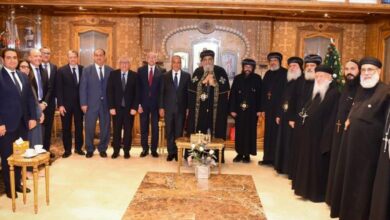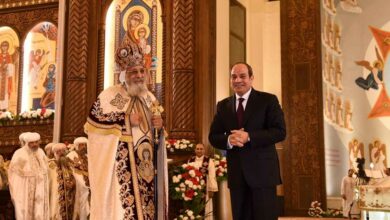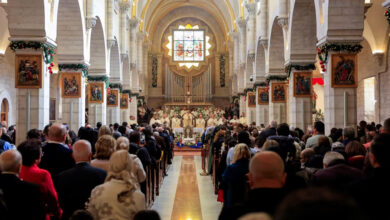As Egypt undergoes unprecedented political changes under the influence of 25 January revolution, Coptic Christians spent Christmas eve alternating between hope and fear.
“This was the worst Christmas celebration I have ever had. Despite the breakout of the revolution, we [Copts] are still living under a threat due to the several sectarian incidents that have taken place lately,” said Hany Youssef, a university student.
Youssef was one of the Coptic protesters who stood hand-in-hand with Muslims during the 18-day protest that began in January, believing that the downfall of the old regime was the only hope for those wanting Copts’ voices to be heard.
However, he feels that the revolution has achieved nothing apart from stripping Egypt’s Christians of more rights and suppressing them.
The burning of a church in the village of Sol, in Atfeeh, in March was one of a series of sectarian attacks against Coptic Christians. Also, the Supreme Council of Armed Forces has so far failed to try three soldiers accused of killing peaceful protesters, mostly Copts, at Maspero on 9 October.
“Things will never be the same,” Micheal Khalil, a jewelry store owner, said in a bitter tone.
Khalil said the Christmas celebration has lost the spirit of togetherness and joy he used to experience with his big family.
“This year our celebration was limited to attending services and making some greetings calls. Loneliness is overwhelming after two of my relatives fled the country due to the increasing sectarian strife along with the growing power of Islamists on political scene,” Khalil explained.
The emergence of an Islamist influence on politics since the downfall of former President Hosni Mubarak is reported to have pushed a considerable number of Coptic Christians to immigrate.
While the Freedom and Justice Party, the Muslim Brotherhood’s political arm, has won a majority of seats in the first post-revolution parliamentary elections, the Salafi Nour Party, which calls for implementing Islamic Law, has came in second place.
Nardeen Milad, 22, and her family decided not to attend mass this year for fear of possible attacks on churches.
“There were threats circulating that a number of churches could be bombed, including the church that was attacked in Nagaa Hammadi, so I preferred to stay at home. Anything is possible now as the sectarian gap is widening,” she said sadly.
After a spokesperson from the ultra-conservative Nour Party said that sending Christmas greetings to Christians is against Muslims' beliefs, Milad felt profound panic and disappointment. “Relations between Christians and Muslims have never reached this stage of deterioration before. Salafis are inciting religious persecution,” she said.
The Brotherhood responded by sending its "best Christmas wishes to our brotherly Christians and Muslims as well," and pledged on Wednesday to set up popular committees to serve as human shields against “iniquitous hands” that might raid churches during Christmas Eve celebrations. Al-Azhar issued a religious edict approving Christmas greetings.
During the past two years, Coptic Christmas Eve has been the occasion of attacks. In January 2011, the bombing of a church in Alexandria claimed 21 lives. A year before, on 6 January, eight Copts were shot in front of a church in the southern town of Nagaa Hammadi.
Despite this state of despondency, some Copts expressed optimism about their future in Egypt’s new era.
“The Brotherhood's initiative is a positive indicator of combating sectarian strife and a call for religious tolerance,” said Maged Khairy, the Coptic owner of a small mobile store.
Khairy attended Christmas mass, insisting, “Nothing can stop me from going to God’s home and enjoying the celebration.”
He added that tight military security around churches dispelled his fears of repeat sectarian violence.
The Interior Ministry in cooperation with the armed forces devised an heavier security plan to assure the safety of Copts, deploying an increased number of troops outside churches.
Milad disagreed with Khairy’s statement, however, having lost trust in the military rulers since military vehicles ran over and killed Copts during the Maspero clashes. “I doubt that the armed forces would protect us, after crashing into innocent people just because they were demanding their rights. It is merely a game that people are sick of,” Milad said.
Mina Abdel Nour, a vendor, believes that Copts’ position could improve if they show more assertiveness.
“We have to stand up for our rights. If every one of us lost hope in the first round, who will fight for reinstating political and social equality for Copts?” he asked.




